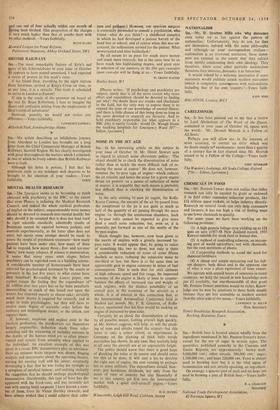NOISE IN THE JET AGE SIR,ŌĆöIn his interesting article on
this subject in your issue of October 10, Mr. Oliver SteWart says in regard to aircraft noise abatement policy : 'The object should be to check the dissemination of noise rather than to tackle the more difficult task of re- ducing the noise at source.' He does not, however, mention the by-pass type of engineŌĆöwhich reduces the jet velocity and hence the noise for a given engine thrust (or power)ŌĆöas a means of reduction of noise at source; it is arguable that such means is probably less difficult than is checking the dissemination of noise.
In the only existing by-pass jet engine, the Rolls-
' Royce Conway, the amount of the air by-passed from the compressor to the jet is not quite as much as half of the quantity of air passing through the main engine, i.e. through the combustion chambers. Such a by-pass ratio cannot be expected to give more than a small noise reduction, but, even so, it is generally put forward as one of the merits of the by-pass engine.
Much thought has, however, now been given to the merits of engines with a greatly increased by- pass ratio. It would appear that, by going to ratios of something like two to three, not only is there a considerable reduction of noise of some fifteen decibels or more, reducing the subjective noise to one-third or less, but there is at the same time an appreciable gain in.engine economy in terms of fuel consumption. This is such that for civil airliners of high subsonic speed and fair range, the improved economy of the engine is likely at least to counter- balance the effects of increased size and weight of such engines, with the distinct possibility of an overall gain in the economy of the aircraft as a whole. It is of interest in this connection that, at the International Aeronautical Conference held in Madrid last month, Mr. F. B. Greatrcx, of Rolls- Royce, mentioned that his firm would be making an engine of increased by-pass ratio.
Certainly let us check the dissemination of noise by all possible means. Getting aircraft high quickly, as Mr. Stewart suggests, will help; so will the plant- ing of trees and shrubs round the airportŌĆöbut this latter to only a minor extent, as experiments in Germany on the planting of thick belts beside autobahns has shown. In any case, they scarcely help at all once the aircraft are at an appreciable height.
The public should know that there is good hope of checking the noise at its source and should press for this to be done. It will cost a lot to develop the right sort of engine, the cost running to perhaps ten or more millions. The expenditure should, how- ever, pay handsome dividends, not only from the point of view of amenity but also financially if we in this country get first into the international market with a quiet civil-aircraft engine.ŌĆöYours faithfully,
H. B. IRVING Witucombe, Leigh Hill Road, Cobham, Surrey


































 Previous page
Previous page